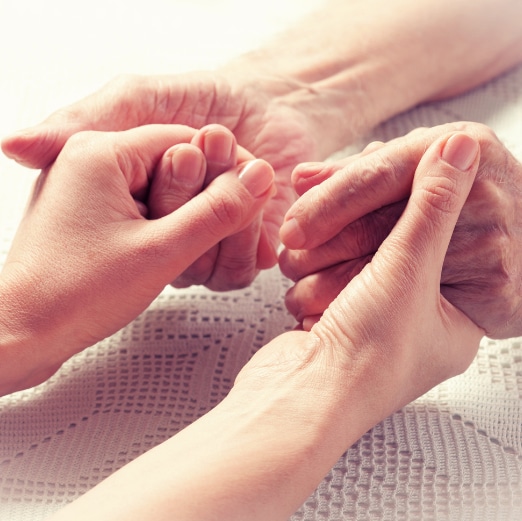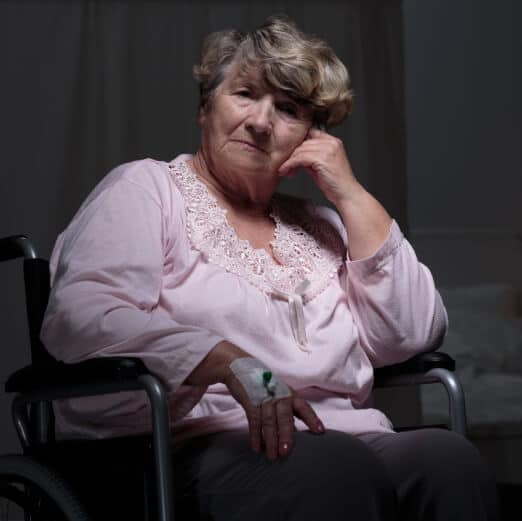Nursing Home Abuse
Nursing Home Lawyer in Arizona
Elder Abuse in Arizona
As the elderly enter the final stages of their life, they undergo common physical conditions such as difficulty hearing, seeing, and memory loss. These physical and mental limitations make them vulnerable to verbal and physical attacks by the professionals that care for them and create opportunities for others to take advantage of them. While signs of abuse can overlap with mental deterioration, each case should be investigated — even if the patient is experiencing neglect.
Common Causes of Nursing Home Abuse in Arizona.
If you have noticed changes in the behavior or personality of your loved one or constant tension between them and their caregiver. You should suspect that there may be signs of abuse, or neglect.
Unfortunately, nursing home abuse can come in many forms, and much of it goes unreported or overlooked. From physical and emotional abuse to neglect or financial exploitation, nursing homes can take advantage of their patients in many ways. If you feel that you or your loved one has been exploited or abused while in the care of a nursing facility, we highly encourage you to speak with a nursing home lawyer with our law team.

Signs of Physical Abuse
- Dislocations, sprains, or broken bones
- Bruising, scars, or welts seen on the body
- Rejecting to take medications
- Signs of restraint, such as strap marks on the elder’s wrist
- Unwillingness by the caregiver to allow you to be alone with your loved one.

Signs of Emotional Abuse
- Fear, anxiety, or depression
- Social Isolation, and loneliness
- Not willing to eat, or engage in physical activity
- Decreased physical health
- Yelling, belittling, controlling, or threatening behavior on the part of the caregiver.

Signs of Caregiver Neglect
- Leaving the elderly personal alone at a public location
- Unsafe living conditions, such as a lack of heat, faulty electrical wiring, fire hazards or lack of running water
- Being unsuitably dressed for the weather
- Not bathing the person or leaving them dirty
- Living with soiled bed clothing, dirty clothes, bugs, or dirty conditions
- The presence of bedsores from not turning the patient regularly
- Having an unusual loss of weight or dehydration
- Untrained or insufficient staff
Unfortunately, nursing home abuse can come in many forms, and much of it goes unreported or overlooked. From physical and emotional abuse to neglect or financial exploitation, nursing homes can take advantage of their patients in many ways. If you feel that you or your loved one has been exploited or abused while in the care of a nursing facility, we highly encourage you to speak with a nursing home lawyer with our law team.
The Elderly Living in Nursing Homes Have Rights
- Right to be free from abuse and neglect
- Right to manage their own finances
- Right to have their own clothes and to have their personal property in their room
- Right to choose their own physician
- Right to participate in decisions about their medical care
- Right to be free of restraints, including physical restraints such as straps or chemical restraints such as unnecessary sedatives
- Right to private, unimpeded visits and communications
- Right to see a lawyer or social worker
- Right to make grievances when they feel their rights are being violated
- Right to refuse to perform work inside the nursing home
Garrison Law Firm Will Fight For the Rights of your Loved One?
Nothing is more important than protecting the rights of our clients and their loved ones. Nursing home abuse claims are complex, it is important to choose an attorney with prior experience and knowledge to help protect your rights and recover damages caused by the injury. Nursing home lawyer Kevin Garrison has over 30 years’ experience winning cases and verdicts for victims of nursing home abuse, our team is prepared to provide the competent legal care you and your loved one deserve.
“Great staff and Mr. Garrison is one of the nicest people I’ve ever met. He Helped me every step of the way. I will always be grateful for the work he has done for me.”
Tiffany J.
Arizona Elder Abuse Laws
“In 1988, the legislature determined that elder abuse in Arizona was a serious problem justifying legislative intervention and enacted the APSA, which criminalized abuse of an incapacitated or vulnerable adult, designating elder abuse a class 5 felony. Denton v. Superior Court, 190 Ariz. 152, 155, 945P. 2d 1283, 1286 (1997) (“The legislature’s intent and the policy behind the elder abuse statutes are clear. Arizona has a substantial population of elderly people, and the legislature was concerned about elder abuse.”) The next year the legislature amended the statute to create a statutory civil cause of action for elder abuse.”
In Estate of McGill ex rel. McGill v. Albrecht(2002) 203 Ariz. 525, 527 57 P.3D 384, 386 the Court discussed the Arizona “Adult Protective Services Act:”
Adopted in 1989, the civil version of APSA was intended to create a statutory civil cause of action. The legislature create this cause of action with the following words:
“An incapacitated or vulnerable adult whose life or health is being or has been endangered or injured by neglect, abuse or exploitation may file an action in Superior Court against any person or enterprise that has been employed to provide care, [or] that has assumed a legal duty to provide care.” A.R.S § 46-455(B).
Incapacitated adults include those suffering from:
Impairment by reason of mental illness, mental deficiency, mental disorder, physical illness or disability, advanced age to the extent that the person lacks sufficient understanding or capacity to make or communicate informed decisions concerning his or her person.
Arizona elder abuse statutes can be found in A.R.S. § 13-3623 which defines abuse. The law in Arizona basically protects adults over 18 who cannot protect themselves due to a mental or physical impairment. Some basic definitions you need to know include:

Emotional Abuse
means a pattern of ridiculing or demeaning a vulnerable adult, making derogatory remarks to a vulnerable adult, verbally harassing a vulnerable adult or threatening to inflict physical or emotional harm on a vulnerable adult.

Physical injury
means the impairment of physical condition and includes any skin bruising, pressure sores, bleeding, failure to thrive, malnutrition, dehydration, burns, fracture of any bone, subdural hematoma, soft tissue swelling, injury to any internal organ or any physical condition that imperils health or welfare.

Serious physical injury
means physical injury that creates a reasonable risk of death or that causes serious or permanent disfigurement, serious impairment of health or loss or protracted impairment of the function of any bodily organ or limb.

Incapacity
means an impairment by reason of mental illness, mental deficiency, mental disorder, physical illness or disability, advanced age, chronic use of drugs, chronic intoxication or other cause to the extent that the person lacks sufficient understanding or capacity to make or communicate informed decisions concerning his/her person.

Vulnerable adult
means an individual who is over eighteen years of age or older who is unable to protect himself from abuse, neglect or exploitation by others because of a physical or mental impairment.
What Types of Damages are Available Under Arizona Elder Abuse Cases?
The plain wording of A.R.S. § 46-455 allows the court to award damages for pain and suffering. If the court finds liability under this statute, it may order the tortfeasor to pay “actual and consequential damages, as well as punitive damages, and costs of suit to those persons injured by the conduct described in this section.” A.R.S. § 46-455(F)(4). Actual damages are synonymous with compensatory damages. Compensatory damages include damages for pain and suffering. Thus, actual damages include damages for pain and suffering, and the elder abuse statute affirmatively permits the trial judge to award such damages.
The legislature’s intent and the policy behind the elder abuse statutes are clear. Arizona has a substantial population of elderly people, and the legislature was concerned about elder abuse. In civil actions for elder abuse, pain and suffering may be the only compensable damages the victim may recover. Because incapacitated or vulnerable adults are not employed, they cannot recover damages for lost earnings or diminished earning capacity. Because incapacitated or vulnerable adults generally have Medicare, Medicaid coverage, or other insurance, they may not recover for medical expenses. Property damage is generally not an issue in elder abuse cases. As a result, the most likely form of damages recoverable in these cases are for pain and suffering. Under the Arizona statutes, damages up to two times the amount of the monetary damages may be established under either A.R.S. §46-456(A),(B) or (C).
The legislature intended to provide victims of elder abuse or their representatives with the ability to recover damages for pain and suffering even if the victim dies prior to judgment. This intent is evident from the plain words and the underlying policy of the elder abuse statute. The court in the Denton decision stated, “We hold that representatives of elder abuse victims may recover damages for pain and suffering endured by the victims, notwithstanding the death of the victims. 190 Ars. 152, 157 945 P.2d 1283, 1288 (199)
Nursing Home Abuse Attorney In Arizona
We proudly serve Surprise, Peoria, Glendale, Avondale, Wickenburg, Buckeye, Phoenix and the surrounding areas.
Kevin Garrison has over 30 years’ experience protecting the rights of nursing home abuse victims. If you or someone you love has suffered nursing home abuse call the father and son law team at Garrison Law Firm.


